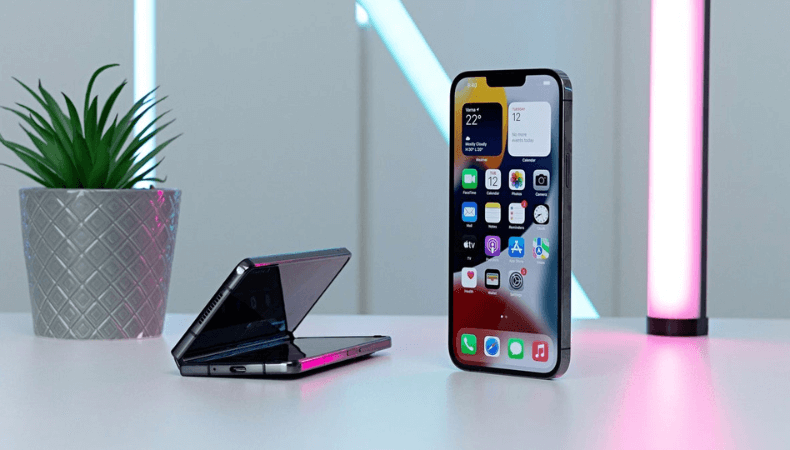Why Apple Needs a Foldable iPhone to Stay Ahead of the Competition

Foldable phones are the latest and hottest trend in the smartphone industry, as more and more manufacturers are launching or planning to launch devices with screens that can bend and fold.
Foldable phones offer a unique and innovative user experience, as they can transform from a compact and portable phone to a large and immersive tablet, or vice versa.
Some of the leading and upcoming foldable phones in the market are:
- Samsung Galaxy Z Fold 5 and Galaxy Z Flip 5: Samsung is the pioneer and the leader in the foldable phone category, with its Galaxy Z series that features two different designs: the Fold, which opens like a book, and the Flip, which folds like a clamshell. The Galaxy Z Fold 5 and Galaxy Z Flip 5 are expected to launch in July 2024, with improved performance, durability, and features.
- Google Pixel Fold: Google is rumored to enter the foldable phone market with its Pixel Fold, which will likely adopt a similar design to the Galaxy Z Fold, but with Google’s signature software and camera capabilities. The Pixel Fold is expected to launch in October 2024, alongside the Pixel 7 and Pixel 7 XL.
- OnePlus V Fold: OnePlus is another newcomer to the foldable phone scene, with its V Fold, which will reportedly have a tri-fold design, meaning it can fold twice to create three different screen sizes. The V Fold is expected to launch in December 2024, with a premium price tag and a flagship performance.
The Gap
Apple, however, has been noticeably absent from the foldable phone race, as it has not released or announced any plans to release a foldable iPhone. Apple is known for its innovation and design, but it has also been cautious and conservative when it comes to adopting new technologies and trends. Apple has often waited for the market to mature and the technology to improve, before launching its own version of a product or a feature, such as the wireless earbuds, the smartwatch, or the 5G connectivity.
Apple’s delay in entering the foldable phone market could be due to several reasons, such as:
- Technical challenges: Foldable phones are complex and difficult to make, as they require advanced and reliable display, hinge, and battery technologies, as well as durable and flexible materials. Apple may be facing technical challenges in developing and testing its foldable iPhone, and may be waiting for the technology to evolve and stabilize.
- User demand: Foldable phones are still a niche and expensive product, as they cater to a limited and specific segment of users, who are willing to pay a premium price for a novel and experimental device. Apple may be unsure of the user demand and the market potential for its foldable iPhone, and may be waiting for the user feedback and the market response to the existing and upcoming foldable phones.
- Design philosophy: Foldable phones are also a departure from Apple’s design philosophy, which emphasizes simplicity, elegance, and consistency. Apple may be reluctant to compromise or change its design principles and aesthetics for its foldable iPhone, and may be looking for a way to create a foldable device that is still recognizably and unmistakably an iPhone.
The Need
However, Apple may not be able to afford to wait much longer, as it may risk losing its competitive edge and its loyal customers to its rivals, who are offering more innovative and diverse options for smartphone users. Apple may need to launch a foldable iPhone soon, for the following reasons:
- To stay ahead of the competition: Apple may need to launch a foldable iPhone to stay ahead of the competition, as it may face increasing pressure and challenge from its competitors, who are gaining more market share and mindshare with their foldable phones. According to a survey by a US travel firm, Samsung has sold more than 10 million foldable phones in 2023, and has captured more than 80% of the foldable phone market. The survey also found that 20% of the foldable phone buyers switched from an iPhone to a Samsung foldable phone⁴. Apple may need to launch a foldable iPhone to retain and attract its customers, and to maintain and enhance its reputation as a leader and an innovator in the smartphone industry.
- To offer more value and versatility to the users: Apple may need to launch a foldable iPhone to offer more value and versatility to the users, as it may provide a better and richer user experience, and a more convenient and flexible user interface. A foldable iPhone could combine the best of both worlds, as it could offer the portability and functionality of a phone, and the productivity and entertainment of a tablet, in one device. A foldable iPhone could also enable more use cases and scenarios, such as multitasking, gaming, watching videos, reading books, and drawing sketches, that would appeal to a wide range of users, from professionals to students, from gamers to artists.
- To showcase its creativity and quality: Apple may need to launch a foldable iPhone to showcase its creativity and quality, as it may demonstrate its ability and capability to create a foldable device that is superior and distinctive from the rest. Apple could leverage its strengths and advantages, such as its design expertise, its software and hardware integration, its ecosystem and services, and its brand loyalty and trust, to create a foldable iPhone that is not only functional and durable, but also beautiful and delightful. Apple could also address and overcome some of the limitations and drawbacks of the current foldable phones, such as the display crease, the battery life, and the camera performance, and set a new standard and benchmark for the foldable phone category.
The Summary
Foldable phones are the latest and hottest trend in the smartphone industry, as more and more manufacturers are launching or planning to launch devices with screens that can bend and fold. Apple, however, has been noticeably absent from the foldable phone race, as it has not released or announced any plans to release a foldable iPhone. Apple’s delay in entering the foldable phone market could be due to several reasons, such as technical challenges, user demand, and design philosophy.
However, Apple may not be able to afford to wait much longer, as it may risk losing its competitive edge and its loyal customers to its rivals, who are offering more innovative and diverse options for smartphone users. Apple may need to launch a foldable iPhone soon, for the following reasons: to stay ahead of the competition, to offer more value and versatility to the users, and to showcase its creativity and quality.



